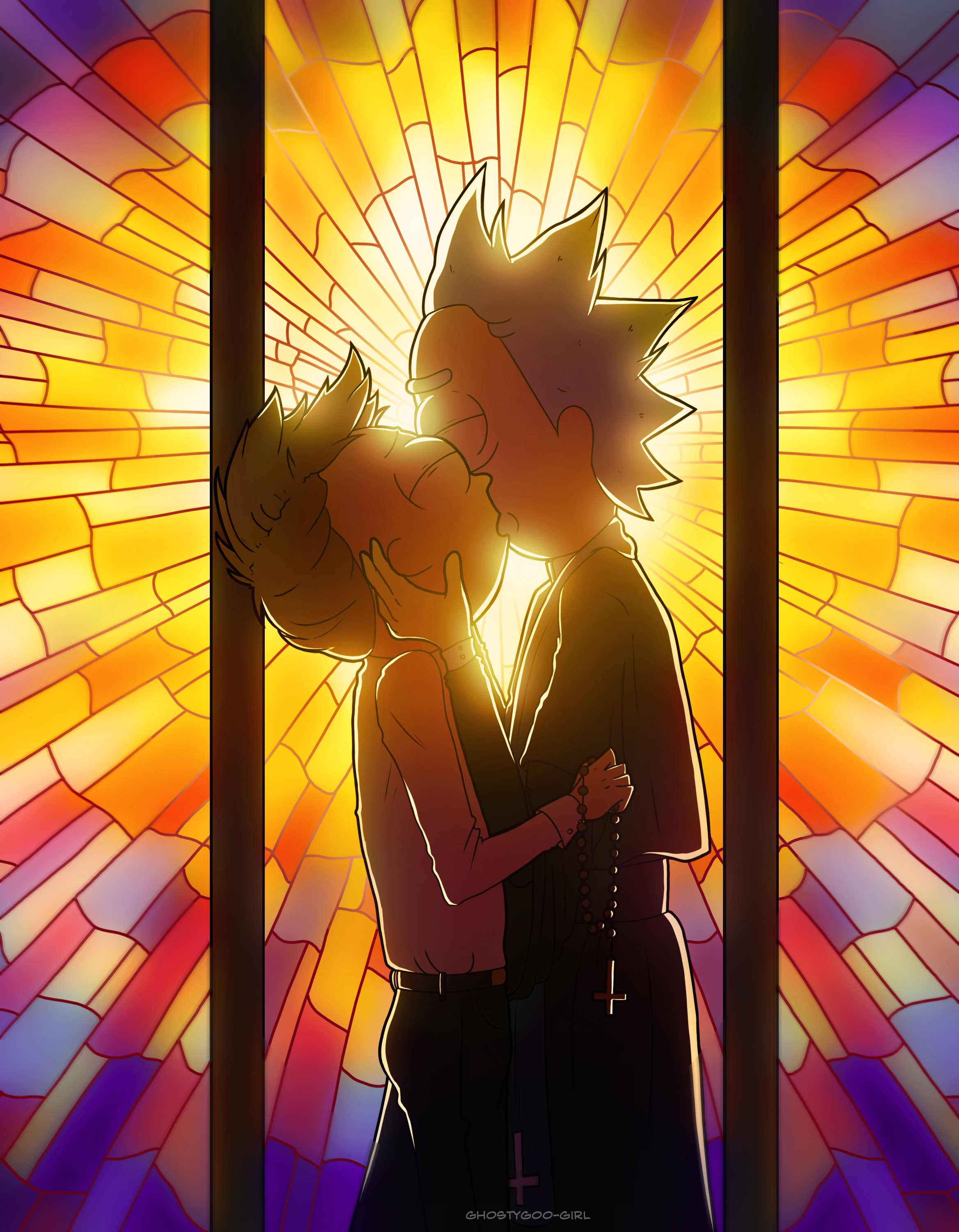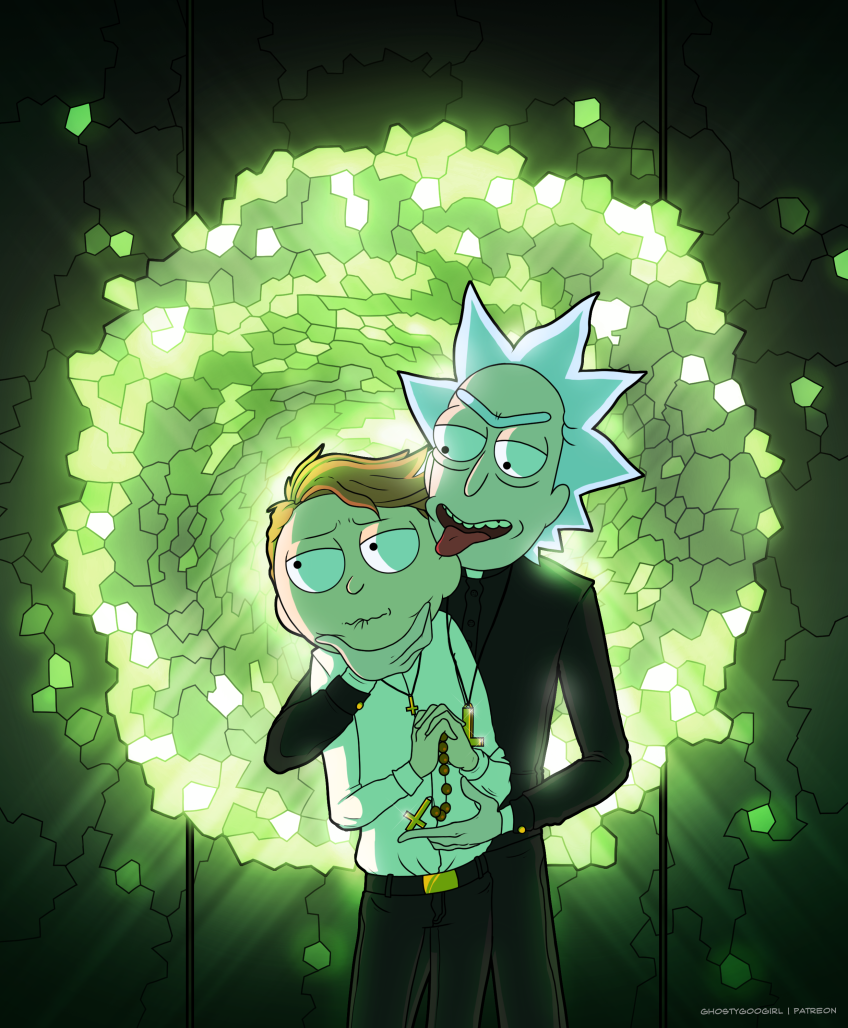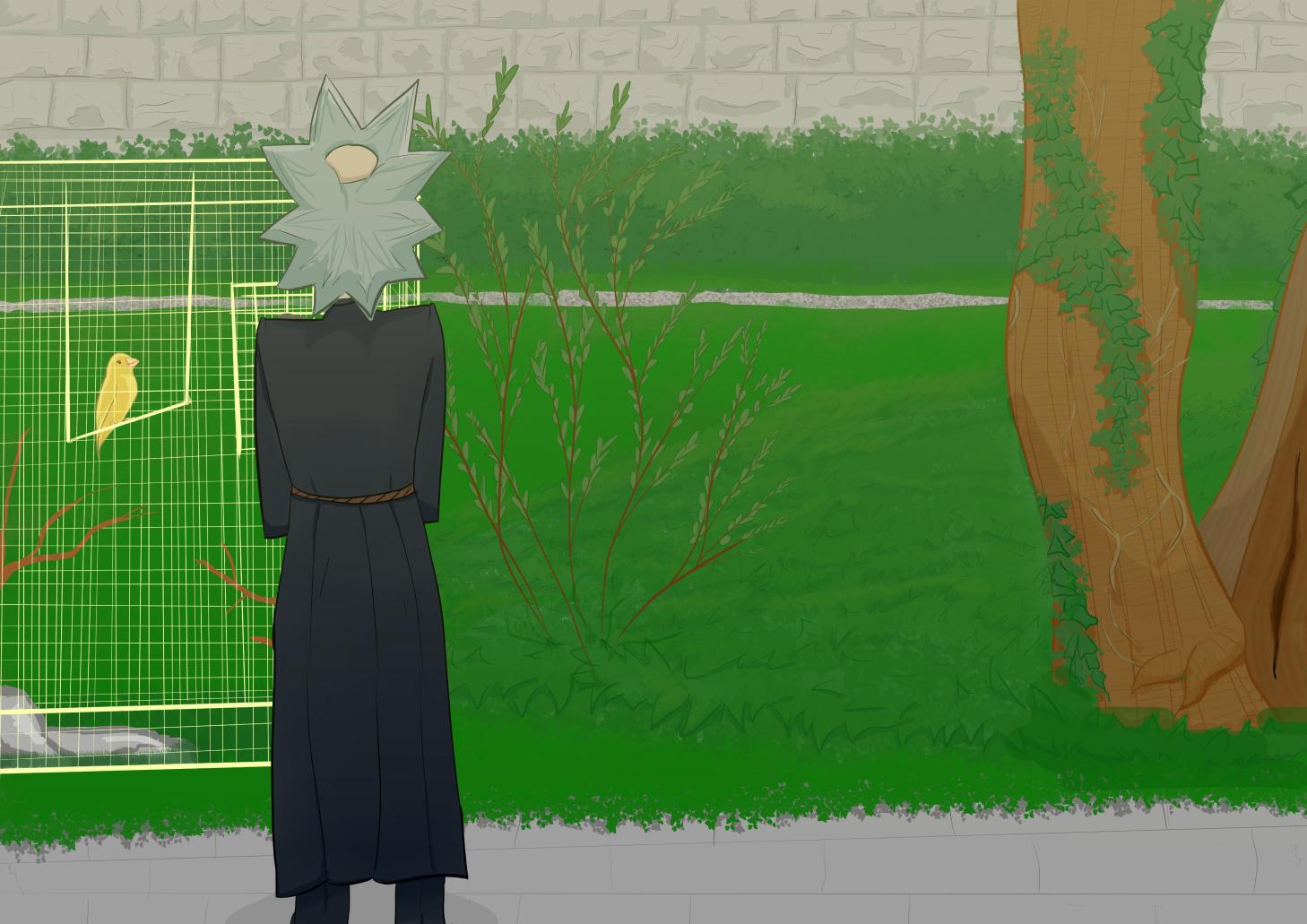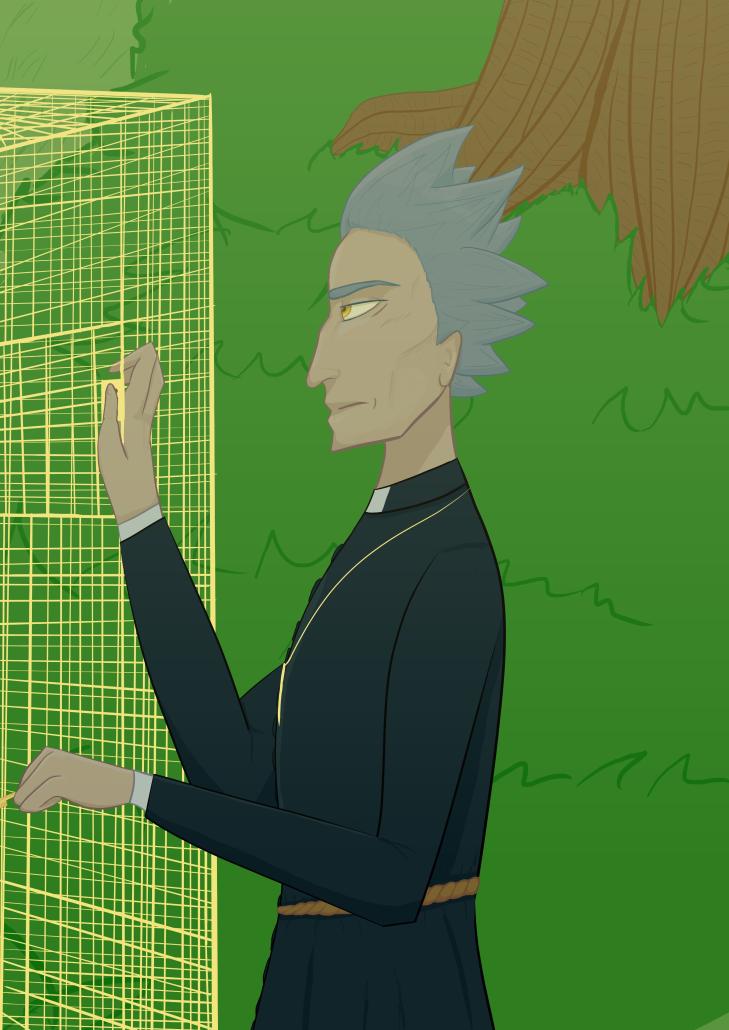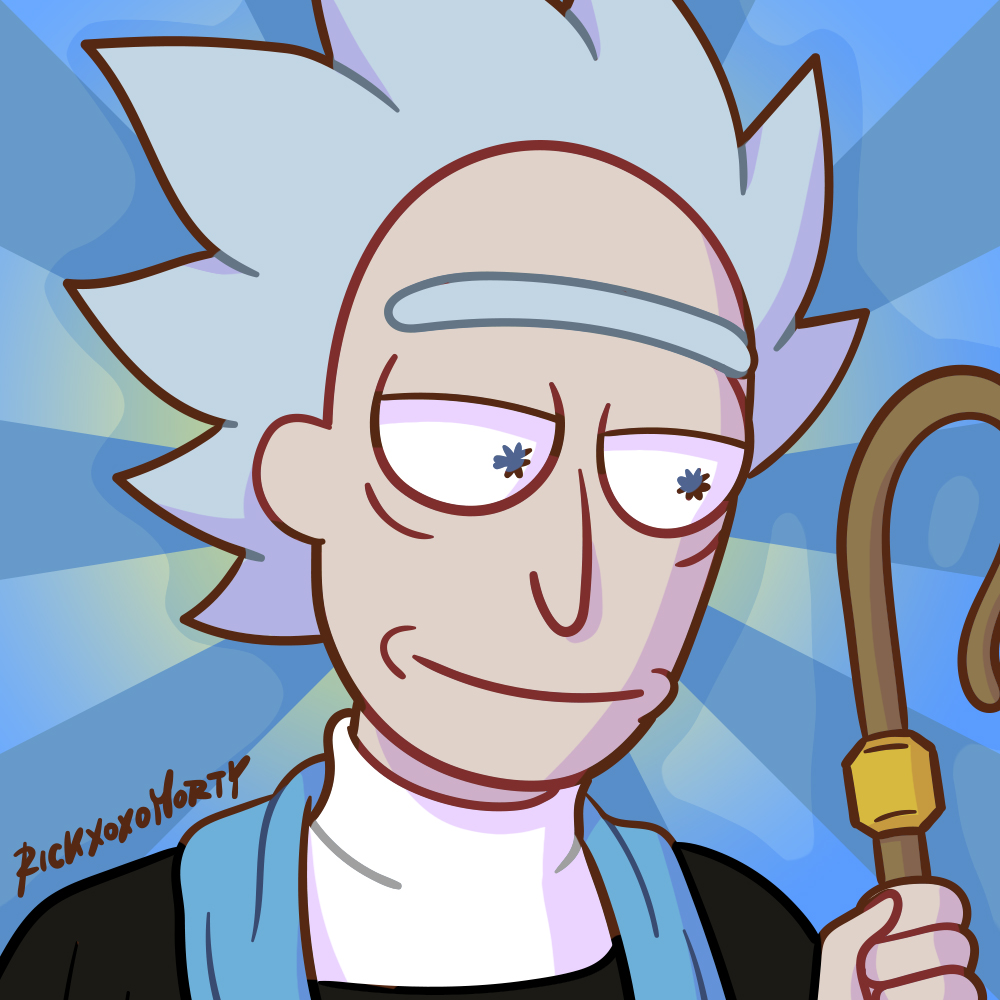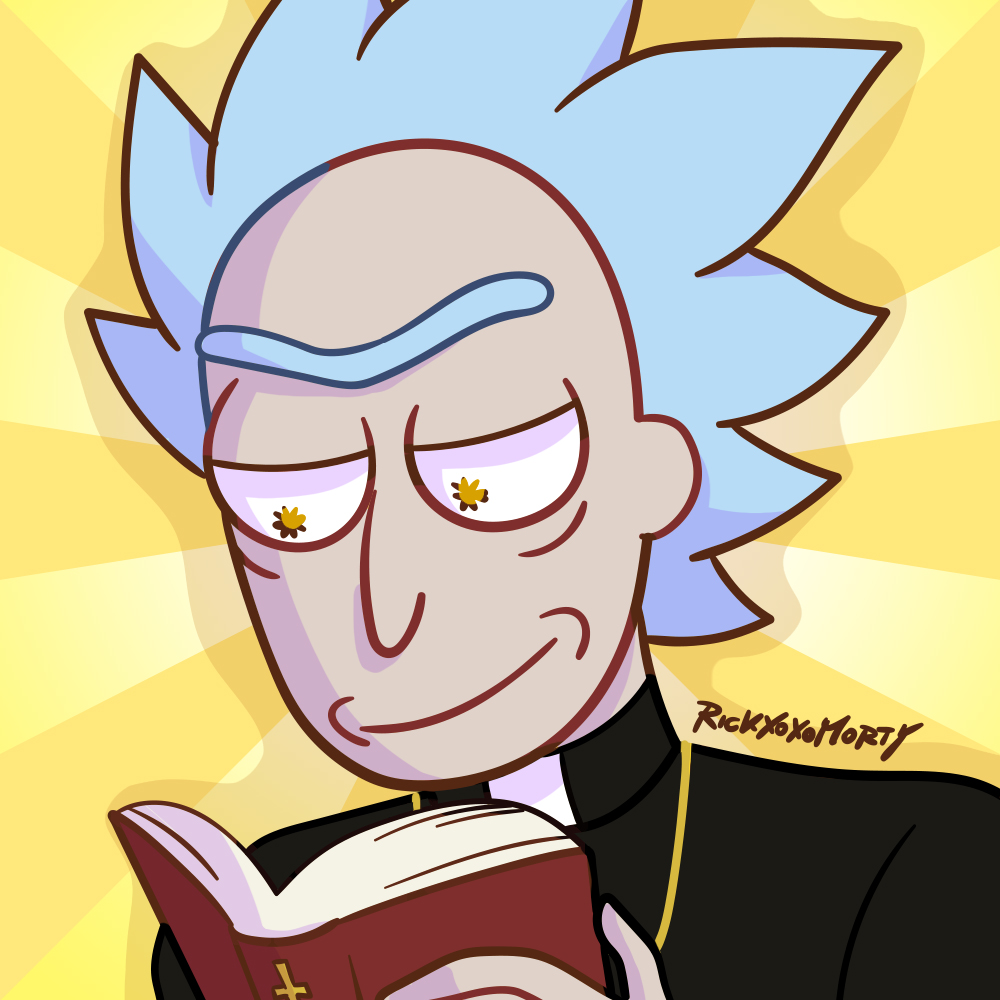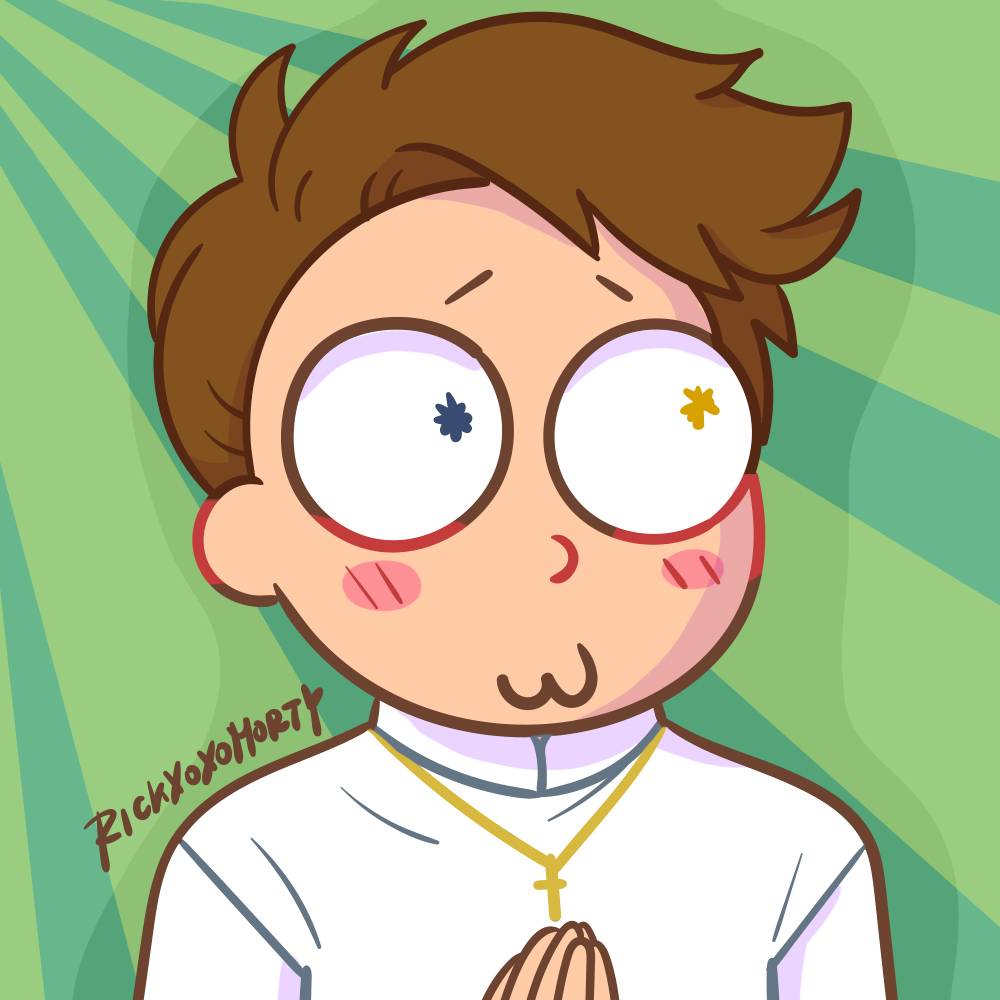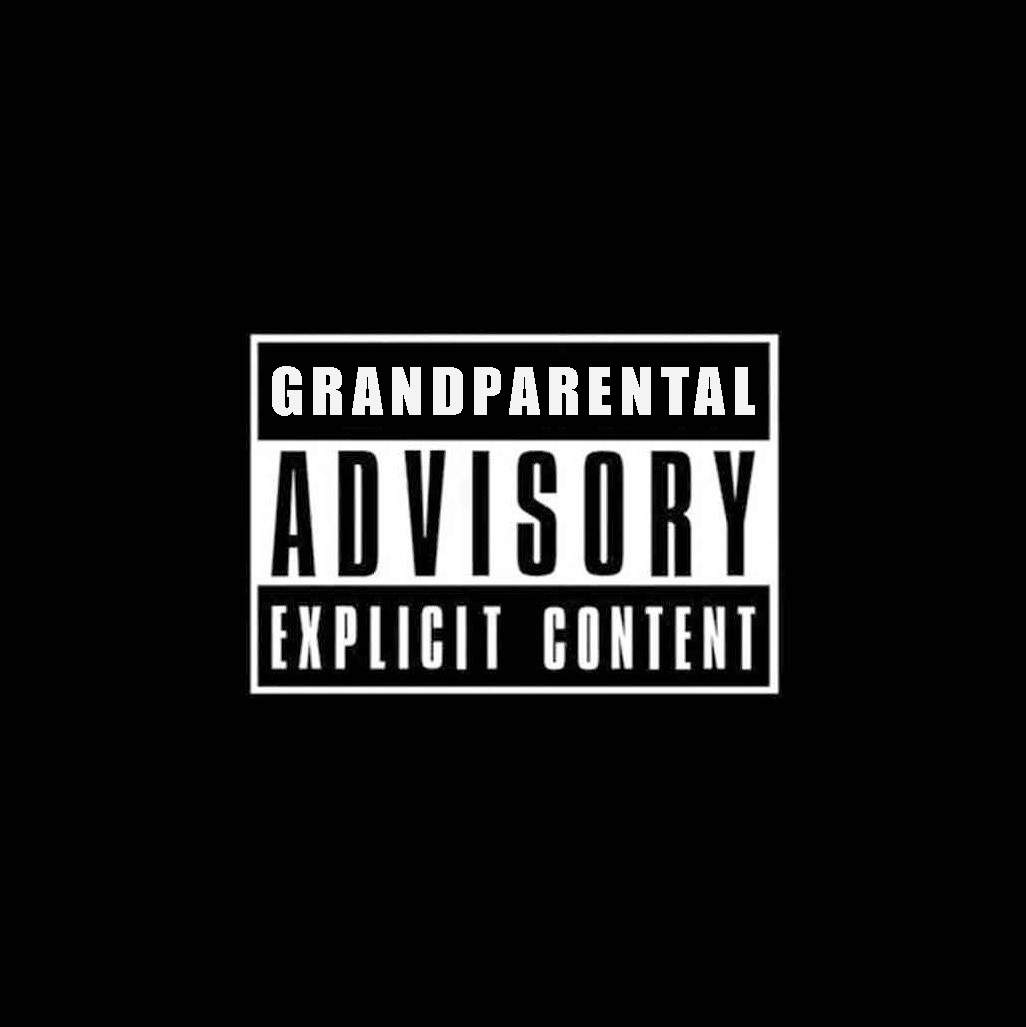Fic-Specific Stuff
Reverend Rick (E-23), named for the old testament book of Ezekiel 23, (A tale of two harlot sisters full of prostitution and sexual sin lusting for cumloads the size of horses). But his character is also inspired by Martin Luther a German professor of theology, composer, priest, monk and a seminal figure in the Protestant Reformation. Luther came to reject several teachings and practices of the Roman Catholic Church. He strongly disputed the Catholic view on indulgences.
Grandfather Rick (J-10), Named from the Book of John, specifically, the passage of God being a shepherd is more new testament. Grandfather Rick is a self-governing entity, who places himself in a position of wisdom and authority not just against Morty’s but other Ricks.
One of the challenges for making Grandfather Rick’s character was considering how someone who adheres to a strict moral system can be interpreted as rebellious, self-governing and well, what we think of as Rick’s core character traits. Grandfather Rick sticks to a more restrictive moral code, yet he is still very in-character. As a Rick, as he expresses a restless discontent for the status quo of the Citadel, and rebels against it by acting as a Rick of Faith, however, the shepherd Ricksona does not make him a good Rick, he has a savior complex, which can cause him to be infantilizing and passively possessive of Morty. He does not take kindly to Revered Rick trying to tempt what he thinks of as “his” lamb.
Morty G-4: Named after the Cain and Abel story in the book of Genesis, which is a reference to both the biblical story, but also John Steinbeck’s East of Eden. Although one of the fundamental ideas in East of Eden is that evil is an innate and inescapable human problem, the novel also sets forth hope that each individual has the freedom to overcome evil by his or her own choice. This idea of free choice is encapsulated in the Hebrew word timshel, which translates to “thou mayest,” and appears in the story of Cain and Abel in the Bible, when God tells Cain that he has the freedom to choose to overcome sin. Steinbeck sees this idea of free will as central to the human condition.
That’s a Rock Kink! Using a lot of stone imagery with Grandfather Rick, his eyes are described as azurite, a blue stone which of course, looks like the stars. Azurite was considered a potent psychic stone shrouded in mystery; its secrets are known only to the highest priests and priestesses. It was called the Stone of Heaven by the ancient Chinese who believed it to open celestial gateways, and was revered by Greeks and Romans for its visionary insights and healing powers. For the Mayans, Azurite inspired the mystical self and facilitated the transfer of wisdom and knowledge via thought, while Native Americans used this sacred stone to contact their spiritual guide.
Reverend Rick’s amber gaze, in contrast, is a rarity on the Citadel. Amber is one of the world’s oldest and most coveted treasures, a “Gold of the Sea” intrinsically formed by light and life, preserved by time and washed up on the shores for humanity, a talisman of beauty, protection, and renewal. It has been portrayed as drops of the sun, tears of the gods, hardened honey, and sunlight solidified and was desired in the most ancient cultures, utilized as far back as the Stone Age for its pleasing warmth of color, value in adornment, and its magical and medicinal properties.
All Sun Dogs go to Heaven: Halos and Sun dogs are a beautiful, atmospheric optical phenomenon on Earth, and it is worth a google.
Overview Effect: Grandfather Rick experiences the overview effect when he first opens the interdimensional portal. The overview effect is a cognitive shift in awareness reported by some astronauts during spaceflight, often while viewing the Earth from outer space.
It is the experience of seeing first-hand the reality of the Earth in space, which is immediately understood to be a tiny, fragile ball of life, "hanging in the void", shielded and nourished by a paper-thin atmosphere. From space, national boundaries vanish, the conflicts that divide people become less important, and the need to create a planetary society with the united will to protect this "pale blue dot" becomes both obvious and imperative.
Cannon, Fannon and Popular Culture
Weird Rick, as C-137, the Central Finite Rick: The Starry AU Has a Fic about this Rick. God Complexes all around. Reverend Rick references Chamus with “Man is the only creature who refuses to be what he is.”
The Menagerie: In S3E5, Morty’s Mindblowers, Rick and Morty are trapped in similar circumstances to Reverend Rick. This scene was a pop-culture reference to Star Trek’s unaired pilot episode, “The Cage”. In it, the characters are captured with the intent to be used as breeding stock for a race of slaves and use their power of illusion to try to interest the characters in sex. Presenting them in various guises and settings, designed to appeal to the base carnal desires.
“I can turn a black hole into a sun, but I couldn’t make it work” Is a quote from the show where Rick talks about his marriage.
The Catacombs: One of my favorite worldbuilding parts of this fic are the underground catacombs and it’s above-ground library counterpart. Here’s some history on the IRL catacombs.
“I got away with it because I didn’t have to think about it.” This a quote lifted from Dan Harmon’s harmontown podcast, where he apologizes for sexually harassing a former employee, Megan Ganz. Full transcript here. But I think Dan intentionally drew a connection with Rick’s popular “don’t think about it” catch phrase, and so I just cranked that idea to 11 in this chapter.
Schrodinger’s Box Morty: If you didn’t get the box themes by now. Here’s me pointing it out cause I’m too damn proud of it.
But also, Quasimodo Morty: It’s revealed that Morty is created with quasi-particles within Rick's lab. These “Fake” quantum particles are an actual thing in the standard models of physics. It’s also a reference to the Hunchback of Notre Dame. Quasimodo’s name means half-formed, and Rick references this when he tells morty that he isn’t a complete recreation of his lost grandchild. An Almost. My heart hurts too, guys.
Rickligion (Multiversalism)
Is The Church of The Infinite Rick a Religion or a Cult?: Aha, that’s the million-flurbo question, isn’t it? The Church of The Infinite Rick is pretty iconoclastic, but most heavily coded as following the rituals and practices of a Catholic denomination. The faith system is built around the ideas of theistic existentialist philosopher, Soren Kierkegaard, and Jaun-Paul Satre, and those philosophical explorations of are given a lens of authenticity through Grandfather Rick, but as a social institution the Rickligion has adapted to socially accommodate the Rick-centric worldview, and the resulting self-absorbed structures and various abuses of power push it into the territory of a cult.
Various forms of God-complexes: The two Ricks in this story offer different interpretations of God through their own god complexes, exploring both old and new structures/systems of morality. This fic leans heavily on Catholic imagery because of it’s age, which feels near otherworldly on the Citadel. Slight differences in The Church of the Infinite Rick version of it, however, create instances of conflict where our characters, existing within the context of an entirely different society than Earth, have to navigate a moral framework that has transitioned from a divinely inspired source to a (more-or-less) individual one.
Brainwashed Rick's Generally conversation around cults focuses on the brainwashed children, and although we assume adults are less likely to fall victim to a cult, they are still susceptible to propaganda, indoctrination, and thought reforming strategies. This fic is pretty ambiguous and leaves to reader interpretation whether or not our characters are brainwashed, self-delusional, or fully cognizant and in control of their choices. Regarding the possibility of a religion or a cult being able to exist on the Citadel, and Ricks being susceptible to its influence, canonically, an entire society of genius’ were bamboozled by a charismatic Evil Morty who they wanted to believe in. I HC that something like the church of the Infinite Rick is totally within the realm of possibility.
Mortyism & Mortytracks:
In canon, the show uses the concept of the One True Morty, as their take on religion. The Church of the Infinite Rick is my much more Rick-centric side of an exploration that slots nicely against it. I wanted to dig into how religion as a social institution might form on the Citadel. Intentionally, it’s given ambiguity as the Church and our characters struggle with finding their place in it, individually and communally.
Holy Bible
The Good Books:I wanted to explore the idea of the holy bible as a compilation of various historical records and perspectives, and apply it to the Rick-centric church in this fic. Similarly, each Rick accounts for their own existence, contributing it to a collective compilation. This treatment of each book being an entry into the collective bible reflects the multiversalist ideas of the Infinite Rick.
Bible(s) Study There are a lot of direct quotes and references to parables in both the Old and New Testaments of the Holy Bible. But I'm not going to list them. There are too many. There are also references to various other religions/faiths/cults as well. Finally, it wouldn't be Lovecraftian-existentialist fic without references to the Church of Satan and the occult, although, in terms of institutional religion, this fic leans more to the more modern interpretation of satinism courtesy of The Statanic Temple.
Thirty Pieces of Silver, and a Pound of Flesh: Judas betrayed Jesus for thirty pieces of silver, which has been used as a metaphor for betrayal. Reverend Rick implies that just as Judas had a part to play, he has to get his hands dirty to protect Grandfather Rick’s virtue. A pound of flesh is a reference to Shakespeare's Merchant of Venice, which plays with ideas of revenge, justice, and mercy. When the main character must pay his dues (a pound of literal flesh), he is saved by the Venetian law that prevents the spilling of Christian blood.
Culture Study There are also alot of references to Christian aphorisms, courtesy of lived experience in bible belt, USA. I'm also not going to list them. But if you know, you know.
Other Religious References
“Were gonna Burn for Everything”: Reference to S1 When Rick got booked in Galactic Federation Jail. It’s an Infinite Rick Joke.
Led Like a Lamb to the Cosmic Slaughter: the line that Morty shares after looking into the eyes of the Truth Turtle is one of my favorite lines. The biblical reference is to the suffering servant in Isiah 53:7. Reverend Rick also sings a related inspired hymn.
Reverend Rick talks about writing a new religion in real time: This wisecrack video about the thanksgiving episode, really gets into it. Worth a watch.
Pascal's Cult? When asked if he’s in a cult, Reverend Rick basically says fuck it. Pascal's wager had everything to do with whether or not belief in God was practical, and as a pragmatist, if the benefits in your life outweigh the downfalls then what does it matter? He argued that belief has inherent benefits and can offer a sense of meaning, order, and comfort to one's life. Reverend Rick blasphemously suggests that cults could have similar benefits, and offers the advice of, either way, take what you want out of it.
Reverend Rick Mentions Docetism: Ancient heresy discourse around whether or not Jesus was actually human or had just taken the form of being a human. Fun concept to explore within the context of infinite realities, all equally real and unreal.
Morty's Dyslexia: There's a lot of symbolism in Morty's inability to read the words of scripture, and having to trust the Ricks of the cloth to guide him. Prior to the Lutheran Reformation, only the parish priests could read and translate the Bible to the common tongue. A key pillar of Martin Luther’s reformation was sola scriptura, or that scriptures are the sole infallible rule of faith and practice, and that it was the individual's responsibility to interpret the meaning for themselves. Reverend Rick gifts Morty with a blank Bible as a continuation of this idea, suggesting that he must write and interpret his own salvation.
The Ritualism of BDSM
Cross & Collar Symbolism Kink, Religion as a Social Institution: Sociologist Emile Durkheim, defined religion in terms of the sacred, or things set apart by society as deserving of reverence. This fic likes to really look at religion through a subjective character lens, exploring what each character thinks of as deserving of reverence. Socially, the point of wearing a visible symbol of one’s religious belief is so that others might recognize it in us. In this fic, the Ricks wear their relationship (virtue or vices) with Morty. The cross imagery is prevalent causing us to evaluate a characters belief systems each time they are made aware of these symbols.
The BD/sM elements explore similar ritualistic meanings that overlay with Durkheim's idea of the sacred: A lifestyle only understood by an inner circle of indoctrinated participants. Worship defined by liturgical rituals, filled with protocol, power exchanges, and suggested 24/7 subservience and participation of one's faith. A break from traditional religion, the dynamics in this fic are not defined by traditional gender roles, but by D/s roles, and it’s been really fun to play with in this fic. I very much plan to keep it up.
Religion as a Social Institute
Symbols of Faith: Symbolic interactionism and Cross Imagery: I’m gonna be playing with a lot of religious iconography and adapting it to serve the needs of this religion/cult. In the Starry AU, I imagine the symbol of the cross would be adapted to represent the light of a guiding star, cause I’m a shameless slut for cosmic imagery.
This fic plays with the concept/symbols of faith. Grandfather Rick’s complexes are the foundation of the Church, and he has imposed his faith onto the Citadel, while Morty hides the symbol, unsure of what it currently means to him. Reverend Rick utilizes the meaning others give them and creates his own symbols to serve his needs. This fic is gonna continue playing with the idea of symbolic interactionism.
Emotional Priming: A great podcast episode that breaks down how worship can emotionally prime people into making shit decisions.
Prosperity Gospel: The Prosperity gospel is a uniquely american take on spirituality, built on the backs of american exceptionalism and manifest destiny. Here’s a great article on how the Mormons Make Money. It gets into the various ways the church functions more like a business. Also there is this great segment about how John Oliver created his own church “Our lady of perpetual tax exemption.” And not to forget the “All-American Prophet” song from the Book of Mormon Musical.
The Riccardi Mordici: Reference to the Palazzo Medici Riccardi in Florence, Italy. The House of Medici was an Italian banking family and political dynasty that first began to gather prominence under Cosimo de' Medici in the Republic of Florence during the first half of the 15th century. Cosimo commissioned a palace to be built close to the church of San Lorenzo: the palace is the first Renaissance building erected in Florence, and the Medici family would continue to become major patrons for the renaissance. Also churchy references to Baroque architecture.
On Institutional Violence: Fun Guardian Article about the Catholic Church. I just really want to share this panel of “Is the catholic church a force of good in the world” starring Stephen Fry and Christopher Hitchens. You’re welcome.
The Courage to Kill Your Gods: another reference to Durkheim’s idea of the Sacred, but also the Nietzcschean concept that “God is dead”. Great Video from Wisecrack about why Rick can’t kill God.
Reverend Rick asks Grandfather Rick if a benevolent God can Sin: The Problem of Evil refers to the question of how to reconcile the existence of evil with an omnipotent, omnibenevolent and omniscient God. An argument from evil claims that because evil exists, either God does not exist or does not have all three of those properties. This omnipotence paradox is also explored with phrases like “Can God make a stone so heavy even he could not lift it?”
Reverend Rick also says he is of the wicked calling, implying that his iteration on the Central Finite Curve is one predetermined to be a counterpoint to the grandfather's, likening his fate to something like Judas.
To have a self is eternity’s demand upon him: This quote of grandfather Rick’s “scripture” is from Soren Kierkegaard.
Epicurean hedonism at its finest: Reverend Rick says “The only true freedom is from the judgment of others.” reflecting some pre-biblical ideas of pleasure as the ultimate good. Pleasure defined as freedom from anxiety and mental pain, especially that arising from needless fear of death and of the gods. In Athens, 300 BC the philosopher and materialist, Epicurus established the world's first commune based around philosophy and communal living spaces. This later influenced Saint Benedict's establishment of the first Monastery. My tongue-in-cheek writing just wanted to have Reverend Rick subvert the monastic communal bathhouse to dip into those conflicting ideas with a surprising shared origin. In line with his moral system, Reverend Rick holds that ethics have no meaning until one must act, so he puts Grandfather Rick’s faith to the test.
Acta Non Verba: "Actions, not words" is written on the chalkboard of the Morty academy in S3E1, so I wanted to incorporate it into bible study. Reverend Rick touches on the ideas of Citadel Society and the intention of the church with the phrase “We are condemned to be free” from French existentialist Jean-Paul Sartre who elaborated, “I create myself through what I do, the choices I make in a world without fixed values. I am what I do. What heightens the anguish is that every sincere decision I take presents a picture of what I believe any human being should be like. In fashioning myself, I fashion humanity.”
The Infinite Rick as the ideal Rick: I HC that The Infinite Rick is a phrase used by Weird Rick in S3E1 to describe the collective identity of Rick Sanchez as its own species of human, similar to a hive mind species like Unity, except for on an interdimensional scale.
In terms of this religion, Grandfather Rick interprets this idea to represent the ideal form or essence of Rick Sanchez and tries to strive toward that idealistic vision he has for himself. Reverend Rick, on the other hand, sees every iteration as contributing to the greater collective, and concerning where he falls into that, takes a stance closer to a Nietzschean stance of Amor Fati, or love of one's own fate.
Postmodern themes of Violence: The Concept of Violence is a good look at violence from a philosophical abstract concept. But this site really condenses the broad spectrum of angles that this fic tried to look at. True to form, this chapter looked at violence of the self, violence toward others, and violence toward god/divinity.
Postmodern themes of Faith: This fic likes to play with various ideas of faith. Reverend Rick focuses heavily on Rene Decarte’s idea of hyperbolic doubt. Reverend Rick believes that until a belief is first questioned, it is not a true choice to believe. Sociologist Emeile Durkheim explores this idea through the lens of capitalism, with his concept of “the sacred and the profane.” Zizek makes a similar argument about atheism. It’s a very existential humanist take.
Inferno of the Same: Byung-Chul Han considers the threat to love and desire in today's society. For Han, love requires the courage to accept self-negation for the sake of discovering the Other. In a world of fetishized individualism and technologically mediated social interaction, it is the Other that is eradicated, not the self. In today's increasingly narcissistic society, we have come to look for love and desire within the “inferno of the same.” If that isn’t describing Citadel of Ricks and Rickcest, I don’t know what is.
The Phenomenology of the Spirit: Rickcest is also just one big reference to Hegel’s Master and Slave Dialectic. Change my mind.
Dialogue between a priest and a dying man: Shoutout to Marquis De Sade, the guy who sadism was named after. Dialogue was one of his earliest surviving works. But Sade is also an example of how wealth and privilege protects individuals who commit atrocious acts of violence.
Christian-Athiest, The Monstrosity of Christ: Reverend Rick wonders what burnt away from Grandfather Rick, and it’s a reference to Zizek’s post-modern concept that God is really what died on the cross, but it opened the doors to positive nihilism. Check out his videos if you’re interested.
Religion is just another brand name: Everything is Opulent and nothing hurts. It’s a very western perspective on extravagant displays of money and power. Contrapoints gets it, and her video essay gets into some of the more consumerist and commodity fetishism themes of Citadel Capitalism.
Emotional Labor of Prostitutes: Zizek believes that ideology is the nature of the transactional lie. The unspoken social rituals that reinforce our own illusions about how society ought to be. Reverend Rick considers the various layers of emotional labor and power dynamics between himself and Morty Magdolyn. Power dynamics are my fucking one true kink guys, and I really loved playing with the concept of power dynamics in this scene.
Powerlust & Will to Power: Reverend Rick’s take on agency within the context of the multiverse has those Nietzschean vibes of will to power.
Free Will & Determinism in The Multiverse and Capitalist Systems: Reverend Rick is always aware that he is a Debtor Rick, in a Debtors Prison. He recognizes Morty’s agency to choose his own life, but he also points out the limitations of free will in that both the Church and the Whore house still exist within the Citadel’s Economic System. Here’s a great video that summarizes this idea. In terms of philosophy and religion, there is a similar idea of free-will. But this chapter really got into the saying, there is no ethical consumption under capitalism. Just wait until the next chapter: Fraudulence.
The Coventry Carol is an old English Carol dating back to the 16th Century. It’s based on the Gospel of Matthew and initially part of a mystery play called The Pageant of the Shearmen and Taylors. it refers to the massacre of infant boys under 2 years in Bethlehem ordered by King Herod who feared for his throne as the birth of a new king was announced. The lyrics are envisioned as a lullaby, sung by mothers to their doomed children.
Prayers of Kierkegaard: Prayers of Kierkegaard is an extended one-movement cantata written by Samuel Barber between 1942 and 1954. The piece has four main subdivisions and is based on the written prayers by Søren Kierkegaard. I thought this existentialist church music fit into the fic and also nods to the spiritual journaling that is a tenet for Ricks of faith serving in the Church.
NFWMB - Nothing Fucks With My Baby: Fuck, Reverend Rick is hot as hell. Hozier said this of his motivation to write this song. “I kind of just wanted to subvert idea of being in love with somebody and feeling like you have to protect somebody…as a dude, ‘Nothing can harm you. Et cetera. I’ll protect you!’ In this it’s not. It’s ‘You can’t be harmed.’ It’s nothing to do with me, this person is just genuinely terrifying. And you love them for it.”
Darkness Visible: Is also a reference to Portrait of a The Artist as a Young Man by James Joyce, which references Paradise Lost. This work is often cited by Hozier as a key inspiration in his music. This coming-of-age story explores the meaning of art, subjectivity, objectivism and aesthetics.
A hell of a lot of references to Dante’s Inferno: Limbo wasn’t technically hell, and chapter one was kind of just a prologue.
Little Match Girl Wish Fulfillment: There are some total shameless nods to Han’s Christian Andersen's Little Match Girl in this chapter. But the Morty lives this time.
The Star of Damocles is an allusion to the greek myth of a sword which always hangs over the king, it symbolizes an imminent and ever-present peril faced by those in positions of power, and I think turning it into an inverted cross, and giving it the symbolism of a star is a wonderful visual metaphor for how Grandfather Rick views his position of faith, where for the church’s followers, it represents a guiding light.
“Hell is empty and the devils are here”:
This all hell breaks loose reference is from Shakespeare’s tragicomedy,
The Tempest. a story of a morally ambiguous father and exiled ruler who uses manipulative magic to restore his daughter to power. He argues that the powerful must show mercy, ultimately breaking his staff and relinquishing his magical powers. I thought it was a nice tie-in to Grandfather Rick’s thoughts, stranded on the Citadel thinking of it as hell incarnate.
Venus in Furs, Rick in the Flesh: There are a lot of references to Venus in Furs, the novella by the Austrian author Leopold von Sacher-Masoch. The novella draws on the themes of female dominance and sadomasochism, but the characters in the story debate the shifting ideas of morality between practices of the old pagan gods and the new Christian ones.
Paradise Lost: In bible study, Reverend Rick references Milton's Paradise Lost, (TBH, The Bible’s first fanfic). The story follows the Morning Star’s (Lucifer’s) fall from grace, and his transformation into Satan, the serpent who tempted Eve with the fruit of the tree of knowledge. Being cast into the Citadel, Reverend Rick’s character is very Luciferian in that his motivations are driven by his lack of being the center of Grandfather Rick’s or Morty’s attention and his lust for power.
Darkness Visible: A nod to Paradise Lost, where Milton describes hell as a great furnace, although the flames of hell give forth no light. He uses the universal symbolism of light and dark to indicate good and evil; applying the same symbolism to Satan, who before his fall, as Lucifer, star of the morning, was the brightest of all the angels; as he becomes progressively more evil after his fall, he gradually loses all of his brightness.
Contrapasso: Reverend Rick ambiguously offers contrapasso, when Grandfather Rick confesses his sin of love. Contrapasso is derived from the Latin contra and patior, which mean "suffer the opposite". It refers to the punishment of souls in Dante's Inferno, "by a process either resembling or contrasting with the sin itself." (I.E. The punishment should fit the crime.)
Behold the Stars: Quote from Dante’s Inferno. Dante and Virgil return to the shining world from hell and in a cathartic moment, the first sight they take in is the stars.
Truth and Beauty: is a reference to the poem, “Ode to a Grecian Urn” by John Keats. It explores the terror found within a work of art’s moment of suspension and explores the paradoxes of time and eternity through a humanistic lens. He sees the frozen moment in time as both beautiful and tragic. In the Starry AU, time moves at a slower rate, which is why Grandfather Rick likes to make the claim of the citadel giving everlasting life.
Mephistopheles: A demon featured in German Folklore. He is already trapped in his own hell serving the Devil. He warns Faustus of the choice to “Sell his Soul”, and advises him not to forgo the promise of heaven for the temporary hedonistic pleasures of life.
“You are what you pretend to be”: Morty Magdolyn tells this to Reverend Rick. It’s a quote from Kurt Vonnegut. It’s a very humanistic existentialist horror that I have applied to the entire Citadel of Rick and Mortysonas.


